《新编英语教程》第 4 册的课文
- 格式:doc
- 大小:461.50 KB
- 文档页数:76
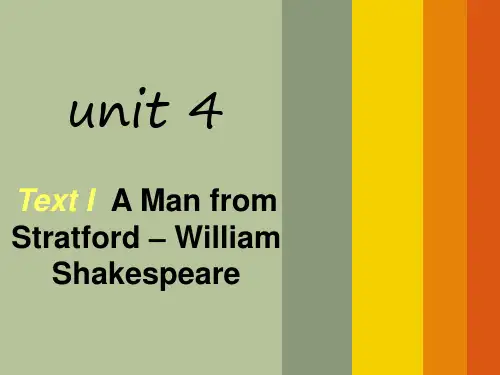
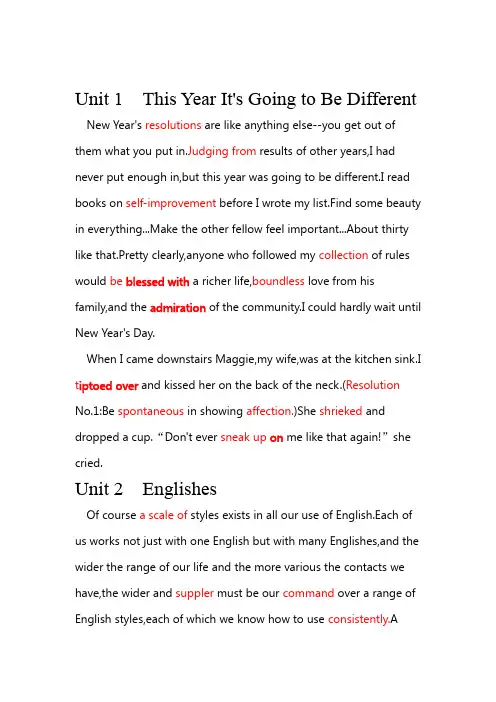
Unit 1 This Year It's Going to Be Different New Year's resolutions are like anything else--you get out of them what you put in.Judging from results of other years,I had never put enough in,but this year was going to be different.I read books on self-improvement before I wrote my list.Find some beauty in everything...Make the other fellow feel important...About thirty like that.Pretty clearly,anyone who followed my collection of rules would be blessed with a richer life,boundless love from his family,and the admiration of the community.I could hardly wait until New Year's Day.When I came downstairs Maggie,my wife,was at the kitchen sink.I t iptoed over and kissed her on the back of the neck.(Resolution No.1:Be spontaneous in showing affection.)She shrieked and dropped a cup.“Don't ever sneak up on me like that again!”she cried.Unit 2 EnglishesOf course a scale of styles exists in all our use of English.Each of us works not just with one English but with many Englishes,and the wider the range of our life and the more various the contacts we have,the wider and suppler must be our command over a range of English styles,each of which we know how to use consistently.Aknowledge of several styles may be worse than useless if haphazardwe do not know when we are sliding from one to another.We do not say,“It was extremely gracious of you to invite me,Lady Jones,and I've had bags of fun,”because“bags of fun”does not mix with“extremely gracious”,and because to use an expressionlike“bags of fun,”we should need to know Lady Jones well enough to be addressing her by her first name.bags of fun can be It is not--we must never tire of insisting--that labelled“bad”or“slovenly”English,“alazysubstitute forthought”,“Bags of fun”is no more a lazy substitute for thought in itsappropriate setting than is“extremely gracious”in the setting that isthis expression.As we have seen repeatedly,it is the appropriate forheight of naivety to go round with a single yardstick,measuring English as“good”or “bad”.Take the opening suggested earlier for aninformal letter:“My dear Frank,it was awfully nice to get your note the other day.”Here are the words that would greatly please the receiver with their warmth and friendliness,yet they include awfullyget nice,three words which have been and condemned so ,often that many people cannot write them without having a slight feeling of guilt. They have been called “slovenly”andeven“meaningless”.Such an attitude is plainly ridiculous and can use of English.do nothing but harm to the goodSalvationUnit 3I was saved from sin when I was going on thirteen.But not really saved.It happened like this.There was a big revival at my Auntie Reed's church.Every night for weeks there had been much preaching,singing,praying,and shouting,and some very hardened sinners who had been brought to Christ,and the membership of the church had grown by leaps and bounds.Then just before the revival ended,they held a special meeting for children,“to bring the young lambs to the fold”.My aunt spoke it for days ahead.That night I was escorted to the front row and placed on the mourners' bench with all the other young sinners,who had not yet been brought to Jesus. My aunt told me that when you were saved you saw a light,andsomething happened to you inside!And Jesus came into yourlife!And God was with you from then on!She said you could see and hear and feel Jesus in your soul.I believed her.I have heard a great many old people say the same thing and it seemed to me they ought to know.So I sat there calmly in the hot,crowdedchurch,waiting for Jesus to come to me.The preacher preached a wonderful rhythmical sermon,all moans and shouts and lonely cries and dire pictures of hell,and then he sang a song about the ninety and nine safe in the fold,but one little lamb was left out in the cold.Then he said:“Won't you come?Won't you come to Jesus?Young lambs,won't you come?”And he held out his arms to all of us young sinners there on the mourners' bench.And the little girl cried.And some of them jumped up and went to Jesus right away.But most of us just sat there.Unit 4 Writing Between the LinesYou know you have to read“between the lines”to get the most out of anything.I want to persuade you to do something equally important in the course of your reading.I want to persuade youto“write between the lines”.Unless you do,you are not likely to do the most efficient kind of reading.I contend,quite bluntly,that marking up a book is not an act of mutilation but of love.There are two ways in which one can own a book.The first is the property right you establish by paying for it,just as you pay for clothes and furniture.But this act of purchase is only the prelude to possession.Full ownership comes only when you have made it a part of yourself,and the best way to make yourself a part of it is by writing in it.An illustration may make the point clear.You buy a beefsteak and transfer it from the butcher's icebox to your own.But you do not own the beefsteak in the most important sense until you consume it and get it into your bloodstream.I am arguing that books,too,must be absorbed in your bloodstream to do you any good.There are three kinds of book owners.The first has all the standard sets and best sellers--unread,untouched.The second has a great many books--a few of them read through,most of them as clean and shiny as the day they were bought.(This person would probably like to make books his own,but is restrained by a false respect for their physical appearance.)The third has a few books or many--every one of them dog-eared and dilapidated,shaken and loosened by continual use,marked and scribbled in from front to back.Unit 5 Network Designer--TimBerners-LeeWant to see how much the world has changed in the past decade?Log on to the Internet,launch a search engine and type in the word“enquire”(British spelling,please).You'll get about 30,000 hits.It turns out you can“enquire”about nearly anything online thesedays,fromusedHarleyDavidsonsforsaleinSydney,Australia(“Enquire about touring bikes,Click here!”),to computer-training-by-e-mail courses in India(“where excellence is not an act but a habit”).Click once to go to a site in Nairobi and enquire about booking shuttle reservations there.Click again,and zip off to Singapore,to a company that specializes in“pet moving.”Enquire about buying industrial-age nuts and boltsNewupstate from“the Bolt Boys”in South Africa,or teddy bears in York.Exotic cigar labels!Four-poster beds for dogs!So what,you say?Everybody knows that with a mouse,a modemand access to the Internet,these days you can point-and-click anywhere on the planet,unencumbered by time or space orlong-distance phone tariffs.Unit 6 Predators,Parasites and Other Relationships The living things in an ecosystem affect each other in many ways.The consumers that kill other animals for food are called predators.The word predator usually bring to mind pictures of lions and wolves,but such creatures as robins,frogs,and humans are also predators.Some predators,carnivores such as lions,depend entirely on animals they kill while many others,such as foxes and humans,eat plant food too.Some people think of predators as“bad”,though humans themselves are the greatest predators the world hasknown.Sometimes individual predators do prey upon farm animals,and these individuals have to be controlled.Toooften,however,people try to wipe out entire populations of predators,with the mistaken idea that they are doing good. People usually believe that predators have an easy time ofit,killing defenseless prey.But studies of predators and their prey Africa,Dr.Georgein tigers observing so.After isn't this that showSchaller wrote:“The tiger's seemingly unbeatable array ofweapons--its acute senses,great speed(but over short distances only),strength and size,and formidable claws and teeth--have given many naturalists the impression that the tiger can kill at will (I)estimate that,for every wild prey killed,the tiger makes twenty to thirty unsuccessful attempts.”Unit 7 A Sunrise on the VeldHe ran closer,and again stood still,stopped by a new fear.Around him the grass was whispering and alive.He looked wildly about,then down.The ground was black with ants,great energetic ants that took no notice of him,but hurried and scurried towards the fighting shape,like glistening black water flowing through the grass.And,as he drew in his breath and pity and terror seized him,the beast fell and the screaming stopped.Now he could hear nothing but one bird singing,and the sound of the rustling whispering ants. Unit 8 AntarcticaSeen from space,the astronauts tell us,the most distinctive feature of our planet is the ice sheet of Antarctica which“radiates light like a great white lantern across the bottom of the world.This ice sheet covers 5,500,000 square miles(an area greater than the United States and Central America combined);it averages more than theof cent per 90 than more contains ;it thickness in feet 7,000world's ice and snow,and if suddenly it melted the oceans would rise to such a height that every other person on earth would be drowned.Antarctica is in fact our planet's largest and most spectacular natural phenomenon.Yet 160 years ago no one had ever set eyes on this vast continent,let alone set foot on it;and even today man's tenure of it is unsure and his knowledge comparatively slight.To understand why,we need to appreciate the sort of place Antarctica is.People used to regard the Arctic and the Antarctic as much alike.In fact their differences outweigh their similarities.The Arctic is closely hemmed in by the populated landmasses of Europe,America and Asia;the Antarctic in contrast is in splendid isolation,divided from the nearest land by vast reaches of the most tempestuous seas on earth.Another big difference is the climate.We are so inclined to think of both the Arctic and Antarctic as cold,that we tend to forget how much colder the latter is.North of the Arctic Circle tens of thousands of families live in comfort all the year round;thousands of plants and animals are able to survive;hundreds of children are born every year.South of the Antarctic Circle,in contrast,there is no habitation that a man can describe as home;the only plants are a handful of mosses and lichens;the only landlife flies;no human childwingless are simply one-celled creatures andhas ever been born there.Unit 9 The PearlA town is a thing like a colonial animal.A town has a nervous system and a head and shoulders and feet.A town is a thing separate from all other towns,so that there are no two towns alike.And a town has a whole emotion.How news travels through a town is a mystery not easily to be solved.News seems to move faster than small boys can scramble and dart to tell it,faster than women can call it over the fences.Before Kino and Juana and the other fishers had come to Kino's brush house,the nerves of the town were pulsing and vibrating with the news--Kino had found the Pearl of the World.Before panting little boys could strangle out the words,their mother knew it.The news swept on past the brush house,and it washed in a f oaming wave into the town of stone and plaster.It came to the priest walking in his garden,and put a thoughtful look in his eyes and a memory of certain repairs necessary to the church.He wondered what the pearl would be worth.And he wondered whether he had baptized Kino's baby,or married him for that matter.The news came to the shopkeepers and they looked at men's clothes that had not sold so well.The news came to the doctor where he sat with a woman whoseillness was age,though neither she nor the doctor would admitit.And when it was made plain who Kino was,the doctor grew stern and judicious at the same time.“He is a client of mine,”the doctor said.“I am treating his child for a scorpion sting.”And the doctor's eyes rolled up a little in their fat hammocks and he thought of Paris.He remembered the room he had lived in there as a great and luxurious place.The doctor looked past his aged patient and saw himself sitting in a restaurant in Paris and a waiter was just opening a bottle of wine.Unit 10 From Composer to Interpreter to Listener What do we listen for when we listen to a composer?He need not tell us a story like the novelist; he need not“copy”nature like the sculptor; his work need have no immediate practical function like the architect's drawing.What is it that he gives us,then?Only one answer seems possible to me:He gives us himself.Every artist's work is,of course,an expression of himself,but none so direct as that of thecreativemusician.Hegivesus,withoutrelationtoexterior“event”,the quintessential part of himself--that part which embodies the fullest and deepest expression of himself as a man and of his experience as a fellow being.Always remember that when you listen to a composer's creation ownhis individual,with particular a man,to a to listening are you special personality.It may be of greater or lesser importance,but,in the case of significant music,it will always mirror that personality.No composer can write into his music a value that he does not possess as a man.His character may be streaked with human frailties--like Lully's or Wagner's,for example--but whatever is fine in his music will come from whatever is fine in him as a man.。
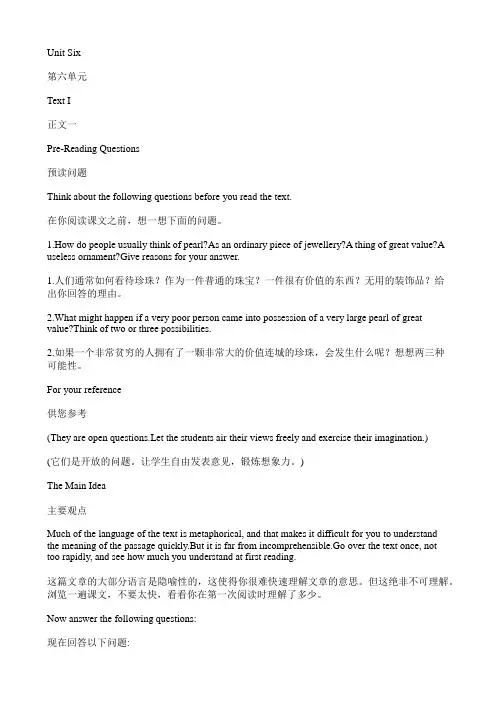
Unit Six第六单元Text I正文一Pre-Reading Questions预读问题Think about the following questions before you read the text.在你阅读课文之前,想一想下面的问题。
1.How do people usually think of pearl?As an ordinary piece of jewellery?A thing of great value?A useless ornament?Give reasons for your answer.1.人们通常如何看待珍珠?作为一件普通的珠宝?一件很有价值的东西?无用的装饰品?给出你回答的理由。
2.What might happen if a very poor person came into possession of a very large pearl of great value?Think of two or three possibilities.2.如果一个非常贫穷的人拥有了一颗非常大的价值连城的珍珠,会发生什么呢?想想两三种可能性。
For your reference供您参考(They are open questions.Let the students air their views freely and exercise their imagination.)(它们是开放的问题。
让学生自由发表意见,锻炼想象力。
)The Main Idea主要观点Much of the language of the text is metaphorical, and that makes it difficult for you to understandthe meaning of the passage quickly.But it is far from incomprehensible.Go over the text once, nottoo rapidly, and see how much you understand at first reading.这篇文章的大部分语言是隐喻性的,这使得你很难快速理解文章的意思。
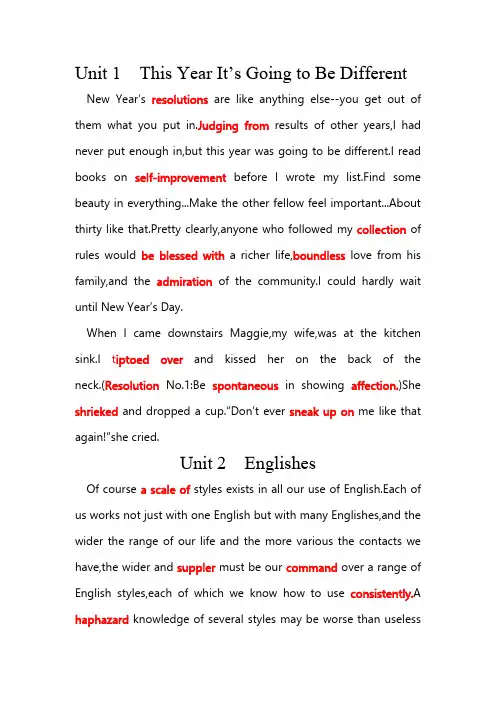
Unit 1 This Year It’s Going to Be Different New Year’s resolutions are like anything else--you get out of them what you put in.Judging from results of other years,I had never put enough in,but this year was going to be different.I read books on self-improvement before I wrote my list.Find some beauty in everything...Make the other fellow feel important...About thirty like that.Pretty clearly,anyone who followed my collection of rules would be blessed with a richer life,boundless love from his family,and the admiration of the community.I could hardly wait until New Year’s Day.When I came downstairs Maggie,my wife,was at the kitchen sink.I t iptoed over and kissed her on the back of the neck.(Resolution No.1:Be spontaneous in showing affection.)She shrieked and dropped a cup.“Don’t ever sneak up on me like that again!”she cried.Unit 2 EnglishesOf course a scale of styles exists in all our use of English.Each of us works not just with one English but with many Englishes,and the wider the range of our life and the more various the contacts we have,the wider and suppler must be our command over a range of English styles,each of which we know how to use consistently.A haphazard knowledge of several styles may be worse than uselessif we do not know when we are sliding from one to another.We do not say,“It was extremely gracious of you to invite me,Lady Jones,and I’ve had bags of fun,”because“bags of fun”does not mix with“extremely gracious”,and because to use an expression like“bags of fun,”we should need to know Lady Jones well enough to be addressing her by her first name.It is not--we must never tire of insisting--that bags of fun can be labelled“bad” or“slovenly” English,“a lazy substitute for thought”,“Bags of fun”is no more a lazy substitute for thought in its appropriate setting than is“extremely gracious” in the setting that is appropriate for this expression.As we have seen repeatedly,it is the height of naivety to go round with a single yardstick,measuring English as“good”or “bad”.Take the opening suggested earlier for an informal letter:“My dear Frank,it was awfully nice to get your note the other day.”Here are the words that would greatly please the receiver with their warmth and friendliness,yet they include awfully,get and nice,three words which have been condemned so often that many people cannot write them without having a slight feeling of guilt. They have been called “slovenly” and even“meaningless”.Such an attitude is plainly ridiculous and can do nothing but harm to the good use of English.Unit 3 SalvationI was saved from sin when I was going on thirteen.But not really saved.It happened like this.There was a big revival at my Auntie Reed’s church.Every night for weeks there had been much preaching,singing,praying,and shouting,and some very hardened sinners who had been brought to Christ,and the membership of the church had grown by leaps and bounds.Then just before the revival ended,they held a special meeting for children,“to bring the young lambs to the fold”.My aunt spoke it for days ahead.That night I was escorted to the front row and placed on the mourners’ bench with all the other young sinners,who had not yet been brought to Jesus.My aunt told me that when you were saved you saw a light,and something happened to you inside!And Jesus came into your life!And God was with you from then on!She said you could see and hear and feel Jesus in your soul.I believed her.I have heard a great many old people say the same thing and it seemed to me they ought to know.So I sat there calmly in the hot,crowded church,waiting for Jesus to come to me.The preacher preached a wonderful rhythmical sermon,all moans and shouts and lonely cries and dire pictures of hell,and then he sang a song about the ninety and nine safe in the fold,but one little lamb was left out in the cold.Then he said:“Won’t youcome?Won’t you come to Jesus?Young lambs,won’t you come?”And he held out his arms to all of us young sinners there on the mourners’ bench.And the little girl cried.And some of them jumped up and went to Jesus right away.But most of us just sat there.Unit 4 Writing Between the LinesYou know you have to read“between the lines”to get the most out of anything.I want to persuade you to do something equally important in the course of your reading.I want to persuade you to“write between the lines”.Unless you do,you are not likely to do the most efficient kind of reading.I contend,quite bluntly,that marking up a book is not an act of mutilation but of love.There are two ways in which one can own a book.The first is the property right you establish by paying for it,just as you pay for clothes and furniture.But this act of purchase is only the prelude to possession.Full ownership comes only when you have made it a part of yourself,and the best way to make yourself a part of it is by writing in it.An illustration may make the point clear.You buy a beefsteak and transfer it from the butcher’s icebox to your own.But you do not own the beefsteak in the most important sense until you consume it and get it into your bloodstream.I am arguing thatbooks,too,must be absorbed in your bloodstream to do you any good.There are three kinds of book owners.The first has all the standard sets and best sellers--unread,untouched.The second has a great many books--a few of them read through,most of them as clean and shiny as the day they were bought.(This person would probably like to make books his own,but is restrained by a false respect for their physical appearance.)The third has a few books or many--every one of them dog-eared and dilapidated,shaken and loosened by continual use,marked and scribbled in from front to back.Unit 5 Network Designer--Tim Berners-Lee Want to see how much the world has changed in the past decade?Log on to the Internet,launch a search engine and type in the word“enquire”(British spelling,please).You’ll get about 30,000 hits.It turns out you can“enquire”about nearly anything online these days,from used Harley Davidsons for sale in Sydney,Australia(“Enquire about touring bikes,Click here!”),to computer-training-by-e-mail courses in India(“where excellence is not an act but a habit”).Click once to go to a site in Nairobi and enquire about booking shuttle reservations there.Click again,and zip off to Singapore,to a company that specializes in“petmoving.”Enquire about buying industrial-age nuts and bolts from“the Bolt Boys”in South Africa,or teddy bears in upstate New York.Exotic cigar labels!Four-poster beds for dogs!So what,you say?Everybody knows that with a mouse,a modem and access to the Internet,these days you can point-and-click anywhere on the planet,unencumbered by time or space or long-distance phone tariffs.Unit 6 Predators,Parasites and Other Relationships The living things in an ecosystem affect each other in many ways.The consumers that kill other animals for food are called predators.The word predator usually bring to mind pictures of lions and wolves,but such creatures as robins,frogs,and humans are also predators.Some predators,carnivores such as lions,depend entirely on animals they kill while many others,such as foxes and humans,eat plant food too.Some people think of predators as“bad”,though humans themselves are the greatest predators the world has known.Sometimes individual predators do prey upon farm animals,and these individuals have to be controlled.Too often,however,people try to wipe out entire populations of predators,with the mistaken idea that they are doing good.People usually believe that predators have an easy time ofit,killing defenseless prey.But studies of predators and their prey show that this isn’t so.After observing tigers in Africa,Dr.George Schaller wrote:“The tiger’s seemingly unbeatable array of weapons--its acute senses,great speed(but over short distances only),strength and size,and formidable claws and teeth--have given many naturalists the impression that the tiger can kill at will (I)estimate that,for every wild prey killed,the tiger makes twenty to thirty unsuccessful attempts.”Unit 7 A Sunrise on the VeldHe ran closer,and again stood still,stopped by a new fear.Around him the grass was whispering and alive.He looked wildly about,then down.The ground was black with ants,great energetic ants that took no notice of him,but hurried and scurried towards the fighting shape,like glistening black water flowing through the grass.And,as he drew in his breath and pity and terror seized him,the beast fell and the screaming stopped.Now he could hear nothing but one bird singing,and the sound of the rustling whispering ants.Unit 8 AntarcticaSeen from space,the astronauts tell us,the most distinctive feature of our planet is the ice sheet of Antarctica which“radiates light like a great white lantern across the bottom of the world.Thisice sheet covers 5,500,000 square miles(an area greater than the United States and Central America combined);it averages more than 7,000 feet in thickness;it contains more than 90 per cent of the world’s ice and snow,and if suddenly it melted the oceans would rise to such a height that every other person on earth would be drowned.Antarctica is in fact our planet’s largest and most spectacular natural phenomenon.Yet 160 years ago no one had ever set eyes on this vast continent,let alone set foot on it;and even today man’s tenure of it is unsure and his knowledge comparatively slight.To understand why,we need to appreciate the sort of place Antarctica is.People used to regard the Arctic and the Antarctic as much alike.In fact their differences outweigh their similarities.The Arctic is closely hemmed in by the populated landmasses of Europe,America and Asia;the Antarctic in contrast is in splendid isolation,divided from the nearest land by vast reaches of the most tempestuous seas on earth.Another big difference is the climate.We are so inclined to think of both the Arctic and Antarctic as cold,that we tend to forget how much colder the latter is.North of the Arctic Circle tens of thousands of families live in comfort all the year round;thousands of plants and animals are able to survive;hundreds of children are born every year.South of theAntarctic Circle,in contrast,there is no habitation that a man can describe as home;the only plants are a handful of mosses and lichens;the only landlife are simply one-celled creatures and wingless flies;no human child has ever been born there.Unit 9 The PearlA town is a thing like a colonial animal.A town has a nervous system and a head and shoulders and feet.A town is a thing separate from all other towns,so that there are no two towns alike.And a town has a whole emotion.How news travels through a town is a mystery not easily to be solved.News seems to move faster than small boys can scramble and dart to tell it,faster than women can call it over the fences.Before Kino and Juana and the other fishers had come to Kino’s brush house,the nerves of the town were pulsing and vibrating with the news--Kino had found the Pearl of the World.Before panting little boys could strangle out the words,their mother knew it.The news swept on past the brush house,and it washed in a f oaming wave into the town of stone and plaster.It came to the priest walking in his garden,and put a thoughtful look in his eyes and a memory of certain repairs necessary to the church.He wondered what the pearl would be worth.And he wondered whether he had baptized Kino’s baby,or married him for thatmatter.The news came to the shopkeepers and they looked at men’s clothes that had not sold so well.The news came to the doctor where he sat with a woman whose illness was age,though neither she nor the doctor would admit it.And when it was made plain who Kino was,the doctor grew stern and judicious at the same time.“He is a client of mine,”the doctor said.“I am treating his child for a scorpion sting.”And the doctor’s eyes rolled up a little in their fat hammocks and he thought of Paris.He remembered the room he had lived in there as a great and luxurious place.The doctor looked past his aged patient and saw himself sitting in a restaurant in Paris and a waiter was just opening a bottle of wine.Unit 10 From Composer to Interpreter to ListenerWhat do we listen for when we listen to a composer?He need not tell us a story like the novelist; he need not“copy” nature like the sculptor; his work need have no immediate practical function like the architect’s drawing.What is it that he gives us,then?Only one answer seems possible to me:He gives us himself.Every artist’s work is,of course,an expression of himself,but none so direct as that of the creative musician.He gives us,without relation to exterior“event”,the quintessential part of himself--that part which embodies the fullest and deepest expression of himself as a manand of his experience as a fellow being.Always remember that when you listen to a composer’s creation you are listening to a man,to a particular individual,with his own special personality.It may be of greater or lesser importance,but,in the case of significant music,it will always mirror that personality.No composer can write into his music a value that he does not possess as a man.His character may be streaked with human frailties--like Lully’s or Wagner’s,for example--but whatever is fine in his music will come from whatever is fine in him as a man.。
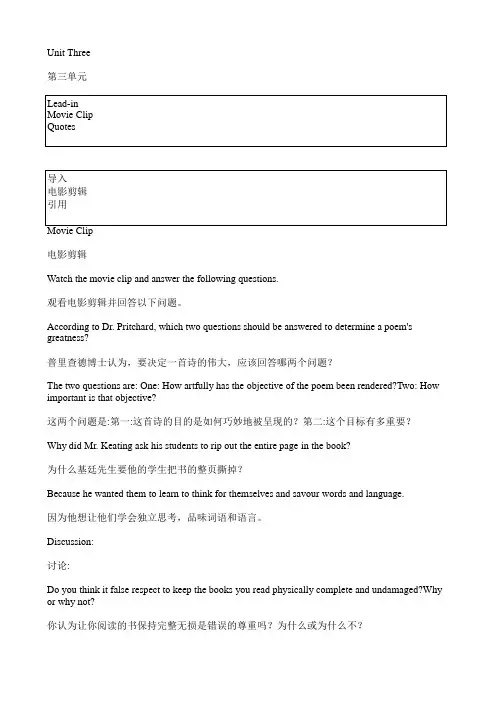
Unit Three第三单元电影剪辑Watch the movie clip and answer the following questions.观看电影剪辑并回答以下问题。
According to Dr. Pritchard, which two questions should be answered to determine a poem's greatness?普里查德博士认为,要决定一首诗的伟大,应该回答哪两个问题?The two questions are: One: How artfully has the objective of the poem been rendered?Two: How important is that objective?这两个问题是:第一:这首诗的目的是如何巧妙地被呈现的?第二:这个目标有多重要?Why did Mr. Keating ask his students to rip out the entire page in the book?为什么基廷先生要他的学生把书的整页撕掉?Because he wanted them to learn to think for themselves and savour words and language.因为他想让他们学会独立思考,品味词语和语言。
Discussion:讨论:Do you think it false respect to keep the books you read physically complete and undamaged?Why or why not?你认为让你阅读的书保持完整无损是错误的尊重吗?为什么或为什么不?(This is an open question.)(这是一个开放的问题。
)Script脚本(From Dead Poets Society)(来自死亡诗人协会)- Gentlemen, open your text to Page 21 of the introduction.Mr. Perry, will you read the opening paragraph of the preface entitled "Understanding Poetry"?-先生们,把你们的文章翻到引言的第21页。
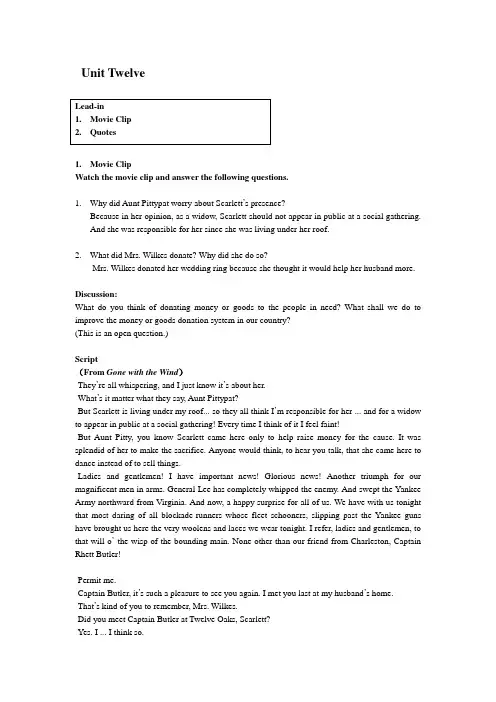
Unit Twelve1.Movie ClipWatch the movie clip and answer the following questions.1.Why did Aunt Pittypat worry about Scarlett’s presence?Because in her opinion, as a widow, Scarlett should not appear in public at a social gathering.And she was responsible for her since she was living under her roof.2.What did Mrs. Wilkes donate? Why did she do so?Mrs. Wilkes donated her wedding ring because she thought it would help her husband more.Discussion:What do you think of donating money or goods to the people in need? What shall we do to improve the money or goods donation system in our country?(This is an open question.)Script(From Gone with the Wind)-They’re all whispering, and I just know it’s about her.-What’s it matter what they say, Aunt Pittypat?-But Scarlett is living under my roof... so they all think I’m responsible for her ... and for a widow to appear in public at a social gathering! Every time I think of it I feel faint!-But Aunt Pitty, you know Scarlett came here only to help raise money for the cause. It was splendid of her to make the sacrifice. Anyone would think, to hear you talk, that she came here to dance instead of to sell things.-Ladies and gentlemen! I have important news! Glorious news! Another triumph for our magnificent men in arms. General Lee has completely whipped the enemy. And swept the Yankee Army northward from Virginia. And now, a happy surprise for all of us. We have with us tonight that most daring of all blockade-runners whose fleet schooners, slipping past the Yankee guns have brought us here the very woolens and laces we wear tonight. I refer, ladies and gentlemen, to that will-o’-the-wisp of the bounding main. None other than our friend from Charleston, Captain Rhett Butler!-Permit me.-Captain Butler, it’s such a pleasure to see you again. I met you last at my husband’s home.-That’s kind of you to remember, Mrs. Wilkes.-Did you meet Captain Butler at Twelve Oaks, Scarlett?-Yes. I ... I think so.-Only for a moment, Mrs. Hamilton. It was in the library. You had broken something.-Yes, Captain Butler, I remember you.-Ladies, the Confederacy asks for your jewelry on behalf of our noble cause.-We aren’t wearing any. We’re in mourning.-Wait. On behalf of Mrs. Wilkes and Mrs. Hamilton.-Thank you, Captain Butler.-Just a moment, please.-But it’s your wedding ring, ma’am.-It may help my husband more, off my finger.-Thank you.-That’s a very beautiful thing to do, Mrs. Wilkes.-Here. You can have mine, too, for the cause.-And you, Mrs. Hamilton, I know just how much that means to you.-Melanie!-Yes, Dr. Meade.-I need your approval, as a member of the Committee ... for something we want to do that’s rather shocking.-Will you excuse us, please?2.QuotesRead the following quotes and tell your classmates which one is your favorite. State your reasons.There are always three speeches, for every one you actually gave. The one you practiced, the one you gave, and the one you wish you gave.—Dale Carnegie But I ... never could make a good impromptu speech without several hours to prepare it.—Mark Twain, 1879 A speech is poetry: cadence, rhythm, imagery, sweep! A speech reminds us that words, like children, have the power to make dance the dullest beanbag of a heart.—Peggy Noonan The nature of oratory is such that there has always been a tendency among politicians and clergymen to oversimplify complex matters. From a pulpit or a platform even the most conscientious of speakers finds it very difficult to tell the whole truth.—Aldous Huxley Always be shorter than anybody dared to hope.—Lord Reading, on speechmaking Oratory is the power to talk people out of their sober and natural opinions.—Joseph Chatfield The eloquent man is he who is no beautiful speaker, but who is inwardly and desperately drunk with a certain belief.—Ralph Waldo Emerson, Journals, 1845 Few speeches which have produced an electrical effect on an audience can bear the colourless photography of a printed record.—Archibald Philip Primrose Public speaking is the art of diluting a two-minute idea with a two-hour vocabulary.—Evan Esar The problem with speeches isn’t so much not knowing when to stop, as knowing when not to begin.—Frances RodmanText I1.Pre-Reading QuestionsHere are two addresses which were made on the same occasion, that is, the dedication of the national cemetery on the battlefield of Gettysburg, Pennsylvania, U.S.A., on November19, 1863. They were made by two different speakers, Abraham Lincoln (1809 – 1865), the 16th president of the U.S.A., and Edward Everett (1794 – 1865), U.S. orator and statesman. What sort of things are usually said in memory of soldiers who were killed in a just war?For your referenceThis is an open question. Exercise your imagination and discuss with your classmates.2.The Main IdeaRead the two Gettysburg Addresses and summarize their main ideas.For your referenceI A: Lincoln’s addressOur forefathers have brought forth a new nation with high principles, and many brave men have fought to death to uphold these principles. We shall carry on and devote ourselves to the unfinished task they began.I B: Everett’s addressI have come to perform my duty to speak on this occasion. It is a good thing that the war has brought about a new bond of union in our country. The bravery of the heroic soldiers will not be forgotten. The glorious battle of Gettysburg will be recorded and remembered.3.Background Note(1) The American Civil WarThe American Civil War, also known as the War Between the States or simply the Civil War, was a civil war fought from 1861 to 1865 in the United States after several Southern slave states declared their secession and formed the Confederate States of America (the ―Confederacy‖or the ―South―). The states that remained were known as the ―Union‖ or the ―North‖. The war had its origin in the fractious issue of slavery, especially the extension of slavery into the western territories. Foreign powers did not intervene. After four years of bloody combat that left over 600,000 soldiers dead and destroyed much of the South’s infrastructure, the Confederacy collapsed, slavery was abolished, and the difficult Reconstruction process of restoring national unity and guaranteeing rights to the freed slaves began.4.TextTEXT I AGettysburg Address(1)Four score and seven years ago, our fathers (1)brought forth on this continent (2)a new nation, (2)conceived in liberty, and dedicated to the proposition that all men are created equal. Now weare engaged in a great civil war, testing whether that nation, or (3)any nation so conceived and so dedicated, can long endure. (4)We are met on a great battlefield of that war. We have come to dedicate a portion of that field, as a final resting place for (5)those who here gave their lives that that nation might live. It is altogether fitting and proper that we should do this. (6)But in a larger sense, we cannot dedicate — we cannot (3)consecrate— we cannot (4)hallow — this ground. The brave men, living and dead, who struggled here, have consecrated it, far above our poor power to add or (5)detract. The world will little note, nor long remember, what we say here, but it can neverforget what they did here. It is for us the living, rather, to be dedicated here to the unfinished work which they who fought here have thus far so nobly advanced. It is rather for us to be here dedicated to the great task remaining before us —that from these honored dead (7)we take increased devotion to that cause for which (8)they gave the last full measure of devotion— that we here highly resolve that these dead shall not have died in vain — that this nation, under God, shall have a new birth of freedom — and (9)that government of the people, by the people, for the people, shall not (6)perish from the earth.By Abraham LincolnTEXT I BGettysburg AddressStanding beneath this serene sky, overlooking these broad fields (1)now (1)reposing from the labors of the waning year, the (2)mighty Alleghenies dimly towering before us, the graves of our(2)brethren beneath our feet, it is with hesitation that I raise my poor voice to break the(3)(3)eloquent silence of God and nature. But the duty to which you have called me must be performed; grant me, I pray you, your (4)indulgence and your sympathy.…And now, friends, fellow citizens of Gettysburg and Pennsylvania, and you from remoter states, let me again, as we part, invoke your (5)benediction on these honored graves. You feel, though the occasion is mournful, that it is good to be here. You feel that it was greatly (6)auspicious for the cause of the country that the men of the East, and the men of the West, the men of nineteen sister states, stood side by side on the (7)perilous ridges of the battle. You now feel it a new bond of union that they shall lie side by side till a (4)clarion, louder than that which (8)marshaled them to the combat, shall awake their (9)slumbers. God bless the Union; it is dearer to us for the blood of brave men which has been shed in its defense. The spots on which they stood and fell; these pleasant heights; the thriving village whose streets so lately rang with the strange din of war; the fields beyond the ridge, where (5)the noble Reynolds held the advancing foe at bay, and, while he gave up his own life, (6)assured by his forethought and self-sacrifice the triumph of the two succeeding days; the little streams which wind through the hills, (7)on whose banks in after-times the wandering plowman will turn up, with the rude weapons of savage warfare, the fearful missiles of modern (10)artillery; Seminary Ridge, the Peach Orchard, Cemetery, Culp, and Wolf Hill, Round Top, Little Round Top, humble names, henceforward dear and famous — no lapse of time, no dis tance of space, shall cause you to beforgotten. ―The whole earth,‖ said Pericles, as he stood over the remains of his fellow citizens, who had fallen in the first year of the Peloponnesian War —―the whole earth is the (11)sepulcher of (12)illustrious men.‖ (8)All time, he might have added, is the millennium of their glory. Surely I would do no injustice to the other noble achievements of the war, which have reflected such honor on (9)both arms of the service, and have entitled the armies and the navy of the United States, their officers and men, to the warmest thanks and the richest rewards which a grateful people can pay. But they, I am sure, will join us in saying, as we bid farewell to the dust of these ―martyr heroes,‖ that wheresoever throughout the civilized world the accounts of this great warfare are read, and down to the latest period of recorded time, in the glorious annals of our common country there will be no brighter page than that which relates to the battles of Gettysburg.By Edward EverettWords and phrases: (点击文中红色单词或词组,出现该红色部分及e.g.字样,再单击e.g. ,出现例句)Text 1 A1.bring forth: bring into existencee.g. It will bring forth great economic benefits from reasonable utilization.We should bring forth new ideas in science and technology through theoretical innovation.2.conceive: v. think of a new idea, plan etc. and develop it in minde.g. Scientists first conceived the idea of the atomic bomb in the 1930’s.Competitive success for organizations, indeed even viability, is being driven more and more by how quickly an organization can conceive and deliver new solutions to the market place.3.consecrate: v. officially state in a special religious ceremony that a place or building is holyand can be used for religious purposese.g. Evidence indicates that all the victims were ritually killed to consecrate successivestages of the pyramid’s construction.The priest promised God he would consecrate his life to helping the poor.4.hallow: v. render holy by means of religious ritese.g. We should learn to hallow whatever ground we happen to stand on or land on.As God’s earthly children who seek to hallow God’s name, we desire our Father’sapproval.5.detract: v. make something seem less goode.g. This fact does not detract from the greatness of her achievement a bit.Even the rainy weather could not detract from their enjoyment of the day.6.perish: v. die, especially in a terrible or sudden waye.g. We must find sources of strength and renewal for our own spirits, lest we perish.The human race would perish unless it changed its manner of existence.Text 1 B1.repose: v. lie at reste.g. The owl hunts while you repose in bed.Ideas should not repose on unsupported facts.2.mighty: a. having or showing great strength or force or intensitye.g. Truth is mighty, and will prevail.The peasant movement is a mighty revolutionary factor insofar as it is directed againstthe large landowners.3.eloquent: a. able to express one’s ideas and opinions well, especially in a way that influencespeoplee.g. The eyes are more eloquent than the words.The delivery of his speech was eloquent and poignant.4.indulgence: n. treating someone with special kindness, often when it is not a good thinge.g. Later on, indulgence and kindness saved me, as severity had ruined me.Patience, understanding, tolerance and indulgence are synonymous with love.5.benediction: n. the act of praying for divine protectione.g. Sending you a bunch of benediction, and blessing you from bottom of my heart.Before beginning his difficult journey, the young man visited his parents to receivetheir benediction.6.auspicious: a. showing that something is likely to be successfule.g. Sixty is an auspicious age in India. It signifies a shift in gears and a different stage oflife.It’s an auspicious time to ask for a raise in salary.7.perilous: a. very dangerouse.g. Their perilous journey across the ocean has attracted public attention.The situation became so perilous that he was advised by a friend to flee.8.marshal: v. organize all the people or things to be ready for a battle, election etc.e.g. The disciples listened for signs in his breathing that he was trying to marshal his lifeforce for the journey ahead.You will take your company to new levels and marshal all the resources of a teamdestined for success.9.slumber: n.literary sleepe.g. If you exercise early in the day, you will be naturally tired by bed-time and will haveno problem falling into a deep slumber.He wishes an oblivious slumber could help him forget what happened today.10.artillery: n. large guns, either on wheels or fixed in one placee.g. The army sent the infantry and artillery to take back the city.Under the cover of strong artillery fire, our troops charged forward.11.sepulcher: n. a small room or building in which the bodies of dead people were pute.g. The old lady said softly, as if her voice were coming from a sepulcher.For his contributions to the city, she was given a sepulcher in the city’s historiccemetery.12.illustrious: a. famous and admired because of what one has achievede.g. Dickens is no doubt one of the most illustrious writers.His illustrious accomplishments made him one of the greatest men in this century.Notes (点击文中蓝色字体,出现该内容,再点击,出现下面的注释内容)Text I A1. Four score and seven years agoeighty-seven years agoa score — twentyIt was in 1863 that Abraham Lincoln gave the address at the site of the battle at Gettysburg, Pennsylvania. Eighty-seven years before had been 1776, the year when the United States of America declared independence.2. a new nation, conceived in liberty, and dedicated to the proposition that all men are created equala new nation, which is founded on the principle of liberty, and is devoted wholly to the proposal that all men are born equalIt is in the U.S. Declaration of Independence that liberty and the proposition are mentioned: ―We hold these truths to be self-evident, that all men are created equal, that they are endowed by their Creator with certain unalienable Rights, that among these are Life, Liberty and pursuit of Happiness.‖3. any nation so conceived and so dedicatedany nation conceived and dedicated in this waySo here is an adverb of manner meaning ―in this / that way‖.4. We are met on a great battlefield of that war.We have gathered together or assembled hereon the great battlefield of that war.The past participle form of the intransitive verb meet is used as an adjective now only on extremely formal occasions, and it sounds rather old-fashioned.For example:We are met here on this important occasion to mark the 50th anniversary of the founding of our country.We are met here in Beijing to welcome the sovereign of the U.K., Queen Elizabeth II.a great battlefield of that war — Gettysburg, the site of the Civil War battle (July 1 – 3, 1863) that forced retreat of the northward invasion of confederate forces. It was a Northern victory and marked the turning point of the American Civil War.5. those who here gave their lives that that nation might livethose who here gave their lives refers to the 7,000-plus men who had died during the Battle of Gettysburg. The first that is a conjunction which means ―so that‖ or ―in order that‖ to introduce an adverbial clause of purpose. The second that is a determiner which modifies nation. That nation refers to the U.S.A.6. But in a larger sense, we cannot dedicate — we cannot consecrate — we cannot hallow —his ground.But strictly speaking, we are not in a position to dedicate, consecrate or hallow this ground; in other words, we are not able to make this place sacred.The reason why Lincoln said this is explained in the following sentences.7. we take increased devotion to that causewe will dedicate our lives even more firmly to the cause of the upholding of liberty and the maintaining of the proposition that all men are created equal8. they gave the last full measure of devotionthey gave their utmost devotion for the last time in their life9. that government of the people, by the people, for the people民有、民治、民享的政府Text I B1. now reposing from the labours of the waning yearrepose — lie at restof the waning year — when the year is coming to an endwane — grow gradually smaller or less after being full or completeFor example:Just as the moon waxes and wanes, every individual has joys and sorrows, partings andreunions, throughout his whole life.After the death of the chief, the tribe’s power quickly waned and they were soon conquered by the neighbouring tribe.2. brethrenbrothersThis is usually used in solemn addresses, i.e., in speaking formally to or about members of a religious group.3.eloquent silencemeaningful, almost poetic silenceHere the writer uses the stylistic device of oxymoron, i.e., the combining of opposite or contradictory ideas or terms. 矛盾修辞法For example:Parting is such sweet sorrow. (from Romeo and Juliet by Shakespeare)sweet sorrow — a feeling that is both sweet and sorrowful 甜蜜痛苦交织的感情(This expresses the relationship of mixed feelings.)cruel kindness — kindness that results in cruelty 害人的仁慈(This expresses therelationship of cause and effect.)thunderous silence — a state which, though silent, produces a thunderous effect 于无声处听惊雷(或此处无声胜有声)(This expresses the relationship of concession.)Better a witty fool than a foolish wit. (from Twelfth Night by Shakespeare) 与其做愚蠢的聪明人,不如做聪明的蠢人。
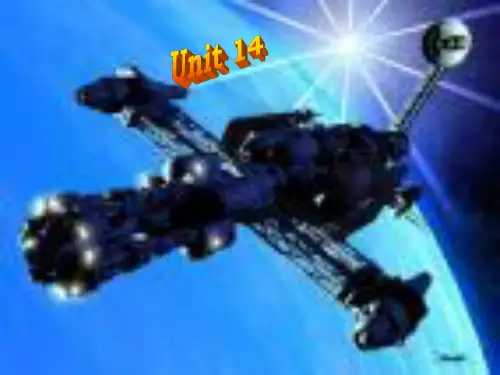
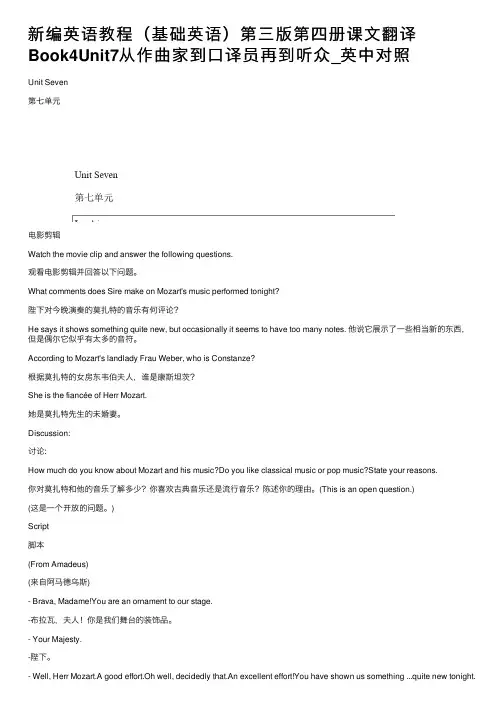
新编英语教程(基础英语)第三版第四册课⽂翻译Book4Unit7从作曲家到⼝译员再到听众_英中对照Unit Seven第七单元电影剪辑Watch the movie clip and answer the following questions.观看电影剪辑并回答以下问题。
What comments does Sire make on Mozart's music performed tonight?陛下对今晚演奏的莫扎特的⾳乐有何评论?He says it shows something quite new, but occasionally it seems to have too many notes. 他说它展⽰了⼀些相当新的东西,但是偶尔它似乎有太多的⾳符。
According to Mozart's landlady Frau Weber, who is Constanze?根据莫扎特的⼥房东韦伯夫⼈,谁是康斯坦茨?She is the fiancée of Herr Mozart.她是莫扎特先⽣的未婚妻。
Discussion:讨论:How much do you know about Mozart and his music?Do you like classical music or pop music?State your reasons.你对莫扎特和他的⾳乐了解多少?你喜欢古典⾳乐还是流⾏⾳乐?陈述你的理由。
(This is an open question.)(这是⼀个开放的问题。
)Script脚本(From Amadeus)(来⾃阿马德乌斯)- Brava, Madame!You are an ornament to our stage.-布拉⽡,夫⼈!你是我们舞台的装饰品。
- Your Majesty.-陛下。
- Well, Herr Mozart.A good effort.Oh well, decidedly that.An excellent effort!You have shown us something ...quite new tonight.莫扎特先⽣。
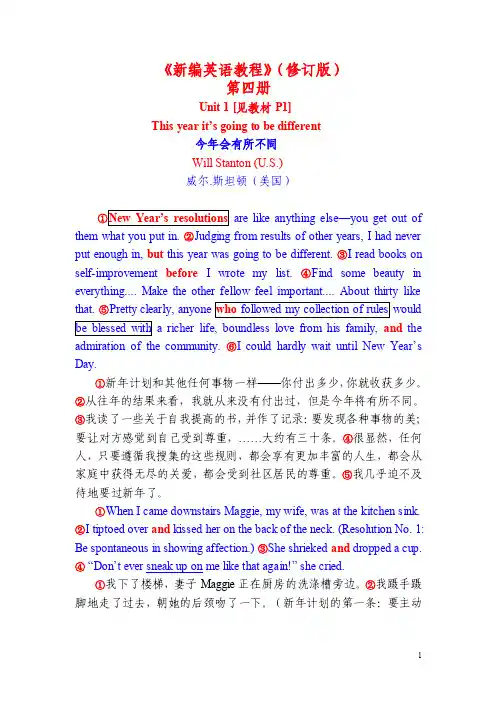
《新编英语教程》(修订版)第四册Unit 1 [见教材P1]This year it’s going to be different今年会有所不同Will Stanton (U.S.)威尔.斯坦顿(美国)are like anything else—you get out of them what you put in. ②Judging from results of other years, I had never put enough in, but this year was going to be different. ③I read books on self-improvement before I wrote my list. ④Find some beauty in everything.... Make the other fellow feel important.... About thirty likethat. ⑤a richer life, boundless love from his family, and the admiration of the community. ⑥I c ould hardly wait until New Year‟s Day.①新年计划和其他任何事物一样——你付出多少,你就收获多少。
②从往年的结果来看,我就从来没有付出过,但是今年将有所不同。
③我读了一些关于自我提高的书,并作了记录:要发现各种事物的美;要让对方感觉到自己受到尊重,……大约有三十条。
④很显然,任何人,只要遵循我搜集的这些规则,都会享有更加丰富的人生,都会从家庭中获得无尽的关爱,都会受到社区居民的尊重。
⑤我几乎迫不及待地要过新年了。
①When I came downstairs Maggie, my wife, was at the kitchen sink.②I tiptoed over and kissed her on the back of the neck. (Resolution No. 1: Be spontaneous in showing affection.) ③She shrieked and dropped a cup.④“Don‟t ever sneak up on me like that again!” she cried.①我下了楼梯,妻子Maggie正在厨房的洗涤槽旁边。
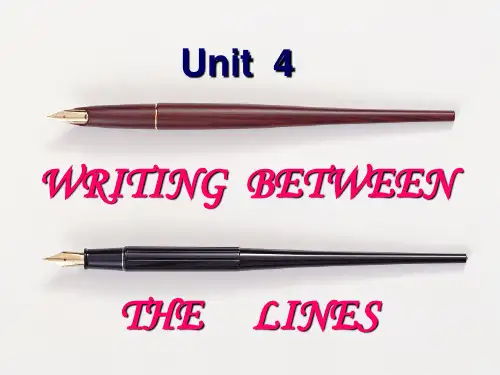
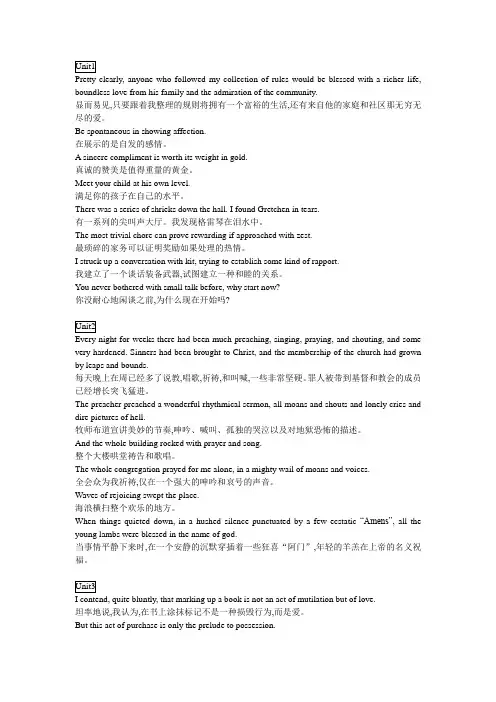
Pretty clearly, anyone who followed my collection of rules would be blessed with a richer life, boundless love from his family and the admiration of the community.显而易见,只要跟着我整理的规则将拥有一个富裕的生活,还有来自他的家庭和社区那无穷无尽的爱。
Be spontaneous in showing affection.在展示的是自发的感情。
A sincere compliment is worth its weight in gold.真诚的赞美是值得重量的黄金。
Meet your child at his own level.满足你的孩子在自己的水平。
There was a series of shrieks down the hall. I found Gretchen in tears.有一系列的尖叫声大厅。
我发现格雷琴在泪水中。
The most trivial chore can prove rewarding if approached with zest.最琐碎的家务可以证明奖励如果处理的热情。
I struck up a conversation with kit, trying to establish some kind of rapport.我建立了一个谈话装备武器,试图建立一种和睦的关系。
You never bothered with small talk before, why start now?你没耐心地闲谈之前,为什么现在开始吗?Every night for weeks there had been much preaching, singing, praying, and shouting, and some very hardened. Sinners had been brought to Christ, and the membership of the church had grown by leaps and bounds.每天晚上在周已经多了说教,唱歌,祈祷,和叫喊,一些非常坚硬。
目 录Unit 1一、词汇短语二、参考译文三、课文精解四、练习答案Unit 2一、词汇短语二、参考译文三、课文精解四、练习答案Unit 3一、词汇短语二、参考译文三、课文精解四、练习答案Unit 4一、词汇短语二、参考译文三、课文精解四、练习答案Unit 5一、词汇短语二、参考译文三、课文精解四、练习答案Unit 6一、词汇短语二、参考译文三、课文精解四、练习答案Unit 7一、词汇短语二、参考译文三、课文精解四、练习答案Unit 8一、词汇短语二、参考译文三、课文精解四、练习答案Unit 9一、词汇短语二、参考译文三、课文精解四、练习答案Unit 10一、词汇短语二、参考译文三、课文精解四、练习答案Unit 11一、词汇短语二、参考译文三、课文精解四、练习答案Unit 12一、词汇短语二、参考译文三、课文精解四、练习答案Unit 1一、词汇短语Text I1. resolution [7rezE5lju:FEn] n. a resolving to do something决心,决定:determined/ unshakable/ inflexible resolution坚定的决心;come to/ form/ make/ take a resolution下定决心2. bless [bles] vt. to confer well-being or prosperity on保佑,赐福:be blessed with 有幸拥有3. boundless [5baJndlIs] adj. having no boundaries or limits无限的,无边无际的:Stars are twinkling in the boundless sky.在辽阔无垠的天空上到处是繁星闪烁。
4. tiptoe [5tiptEu] vi. to walk or move quietly on one’s toes踮起脚走:She tiptoed to the bedside of the sleeping child.她用脚尖悄悄地走到酣睡的孩子床前。
(全新版)英语综合教程第四册课⽂英语原⽂及全⽂翻译They say that pride comes before a fall. In the case of both Napoleon and Hitler, the many victories they enjoyed led them to believe that anything was possible, that nothing could stand in their way. Russia's icy defender was to prove them wrong. ⼈道是骄兵必败。
就拿拿破仑和希特勒两⼈来说吧,他们所向披靡,便以为⾃⼰战⽆不胜,不可阻挡。
但俄罗斯的冰雪卫⼠证明他们错了。
The Icy DefenderNila B. Smith1 In 1812, Napoleon Bonaparte, Emperor of the French, led his Grand Army into Russia. He was prepared for the fierce resistance of the Russian people defending their homeland. He was prepared for the long march across Russian soil to Moscow, the capital city. But he was not prepared for the devastating enemy that met him in Moscow -- the raw, bitter, bleak Russian winter.冰雪卫⼠奈拉·B·史密斯1812年,法国皇帝拿破仑·波拿巴率⼤军⼊侵俄罗斯。
他准备好俄罗斯⼈民会为保卫祖国⽽奋勇抵抗。
在生活中,没有什么比顿悟更令人激动和兴奋的,它可以改变一个人---------不仅仅是改变,而且变得更好。
当然,这种顿悟是很罕见的,但仍然可以发生在我们所有人身上。
它有时来自一本书,一个说教或一行诗歌,有时也来自一个朋友。
在曼哈顿一个寒冷的冬天下午,我坐在一个法国小餐馆,倍感失落和压抑。
因为几次误算,在我生命中一个至关重要的项目就这样落空了。
就因为这样,甚至连期望看到一个老朋友(我常常私下亲切的想到的一个老人)的情形都不像以前那样令我兴奋。
我坐在桌边,皱起眉头看着色彩多样的桌布,清醒地嚼着苦涩的食物。
他穿过街道,过着旧棉袄,一顶帽子从光头打下来,看上去不像是一个有名的精神病医生,倒像是一个精力充沛的侏儒。
他的办公室在附近到处都有,我知道他刚刚离开他最后一个病人。
他接近80岁,但仍然扛着一个装着满满文件的公文包,工作起来仍然像一个大公司的主管,无论何时有空,他都仍然爱去高尔夫球场。
当他走过来坐在我旁边时,服务员早已把他总是要喝的啤酒端了过来。
我已经几个月没有见他了,但他似乎还是老样子。
没有任何寒暄,他就问我“怎么了,年轻人?”我已经不再对他的样子感到奇怪,所以我详细地把烦恼告诉他。
带着一丝忧伤的自豪,我尽量说出实情,除了我自己,我并没有因为失望而责备任何人。
我分析了整件事情,但所有负面评价以及错误仍然继续。
我降了约有十分钟,这期间老人只是默默的喝着啤酒。
我讲完后,他取下眼镜说:“到我的办公室去。
”“到你的办公室?你忘了带什么了吗?”他和蔼的说“不是,我想看看你对某些事情的反应,仅此而已。
”外面开始下起小雨,但他的办公室很温暖,舒服,亲切:放满书的书架靠着墙壁,长皮沙发Sigmund佛洛依德的亲笔签名照,还有墙边放着的录音笔。
他的秘书已经回家了,只有我们在那里。
老人从纸盒里拿出一盘磁带放进录音笔,然后说:“这里面有到我这里来求助的三个人的简单录音,当然,这没有说明具体是那三个人。
我想让你听听,看你是否能找出双字词的短语,这里是在三个案例中共有的。
Unit6Text1珍珠一个城市就好象一种群栖的动物。
一个城市有神经系统,也有头,也有肩,也有脚。
一个城市也有一种整体的感情。
消息怎样在一个城市传开是一件不容易解释的神秘事情。
消息传起来,似乎比小男孩们争先恐后跑去告诉人家那样还要快,比女人们隔着篱笆喊着告诉邻居那样还要快。
在奇诺、胡安娜和别的渔民还没有来到奇诺的茅屋以前,这个城的神经系统已经随着这消息在跳动和震颤了——奇诺找到了“稀世宝珠”。
在气喘吁吁的小男孩们还来不及讲完之前,他们的母亲已经知道了。
这消息越过那些茅屋继续向前冲去,在一阵浪花飞溅的波涛中冲进那石头与灰泥的城市。
它传到正在花园里散步的神父那里,使他的眼中出现一种若有所思的神情,使他想起教堂里必须进行的一些修葺。
他不晓得那颗珍珠会值多少钱。
他也不晓得他有没有给奇诺的孩子施过洗,或者有没有给奇诺司过婚。
这消息传到开铺子的人那里,他们便看看那些销路不大好的男人衣服。
这消息传到大夫那里,他正和一个太太坐着,这女人的病就是年老,虽然她本人和大夫都不肯承认这个事实。
等他弄明白奇诺是谁以后,大夫就变得既严肃又懂事了。
“他是我的顾客,”大夫说。
“我正在给他的孩子治蝎子螫的伤。
”大夫的眼睛在它们肥胖的窝里向上翻着,他想起了巴黎。
在他回忆中,他在那里住过的屋子成了一个宏大奢华的地方,跟他同居过的面貌难看的女人成了一个又美丽又体贴的少女,尽管她完全不是那么回事。
大夫的眼光越过他那年老的病人,看到自己坐在巴黎的一家餐馆里,一个侍者正在打开一瓶酒。
这消息一早就传到教堂前面的乞丐们那里,使他们高兴得吃吃地笑了一阵,因为他们知道世界上没有比一个突然走运的穷人更大方的施舍者了。
奇诺找到了“稀世宝珠”。
在城里,在一些小铺子里,坐着那些向渔夫收买珍珠的人。
他们在椅子上坐着等待珍珠送进来,然后他们就唠叨,争吵,叫嚷,威胁,直到他们达到那渔夫肯接受的最低的价钱。
可是他们杀价也不敢超过一个限度,因为曾经有一个渔夫由于绝望,把他的珍珠送给了教会。
《新编英语教程》(修订版)第四册Unit 1 [见教材P1]This year it’s going to be different今年会有所不同Will Stanton (U.S.)威尔.斯坦顿(美国)are like anything else—you get out of them what you put in. ②Judging from results of other years, I had never put enough in, but this year was going to be different. ③I read books on self-improvement before I wrote my list. ④Find some beauty in everything.... Make the other fellow feel important.... About thirty likethat. ⑤a richer life, boundless love from his family, and the admiration of the community. ⑥I c ould hardly wait until New Year’s Day.①新年计划和其他任何事物一样——你付出多少,你就收获多少。
②从往年的结果来看,我就从来没有付出过,但是今年将有所不同。
③我读了一些关于自我提高的书,并作了记录:要发现各种事物的美;要让对方感觉到自己受到尊重,……大约有三十条。
④很显然,任何人,只要遵循我搜集的这些规则,都会享有更加丰富的人生,都会从家庭中获得无尽的关爱,都会受到社区居民的尊重。
⑤我几乎迫不及待地要过新年了。
①When I came downstairs Maggie, my wife, was at the kitchen sink.②I tiptoed over and kissed her on the back of the neck. (Resolution No. 1: Be spontaneous in showing affection.) ③She shrieked and dropped a cup.④“Don’t ever sneak up on me like that again!” she cried.①我下了楼梯,妻子Maggie正在厨房的洗涤槽旁边。
②我蹑手蹑脚地走了过去,朝她的后颈吻了一下。
(新年计划的第一条:要主动表示关心。
)③她尖叫一声,把一个茶杯摔倒地上,对我大声嚷道“再也不要悄悄地走到我身后啦!”①“You’re looking lovely this morning,” I said. (A sincere compliment is worth its weight in gold. )①“你今天上午看起来非常可爱,”我说。
(新年计划:真诚的赞美像金子一样宝贵。
)①“Look,” she said, “it wasn’t my idea to stay out until four a.m.”“要知道,”她说,“并不是我想要在外边待到凌晨四点的。
”①I took some aspirin and coffee into the living room. ②I’d just started reading the paper when Sammy, our five-year-old, came in. ③He was wearing the watch he’d received for Christmas.④“Say, Dad,” he said, “what makes a watch run?”①我拿了一些阿司匹林和咖啡来到客厅。
②我刚要开始读报,就在这时,五岁的儿子Sammy进来了。
③他正戴着手表,那是他收到的圣诞礼物。
④他说:“爸爸,是什么让这个表转起来的呢?”②Instead,I got a pencil and drew a sketch of the escapement mechanism. (Always encourage your child’s curiosity.) ③It took about fifteen minutes, and Sammy wandered off several times, but I kept calling him back.④“There,” I said, “that’s what makes your watch run.”①要是在以前,我会让儿子去问他妈妈,而这次我拿了一支铅笔,给他画了一张手表的擒纵结构图。
(新年计划:要时刻鼓励孩子的好奇心。
)②画图大约用了十五分钟,在此期间Sammy有几次走开,但我都把他叫了回来。
③“你看,”我说,“就是这个让表转起来的。
”“Then how come it doesn’t?” he asked.“那表为什么又停了呢?”他又问道。
①His brother Roy walked by. ②“You have to wind it,” said Roy.③Sammy wound it and held it to his ear. ④He smiled. ⑤“Roy sure is smart,” he said.①这时他的哥哥Roy经过。
②“你要给表上发条才行,”Roy说。
③Sammy 上了发条,又拿到耳朵上听。
④他笑了,说:“Roy真聪明。
”①Our daughter Gretchen came in with her doll, Mrs. Robinson.②“Good morning, Gretchen,” I said. “Happy New Year, Mrs. Robinson.” (Meet your child at his own level. )①我们的女儿Gretchen抱着她的玩偶Robinson夫人进来了,我说:“早上好,Gretchen;新年快乐,Robinson夫人。
”②(新年计划:要在孩子的层面上和他们交流。
)①“It isn’t either happy,”said Gretchen. “Mrs. Robinson is sick. Probably a coronary.”①“她一点都不快乐,”Gretchen说,“Robinson夫人病了,可能得了冠状动脉血栓症。
”①“Why don’t you take her to see Dr. Sammy?” I suggested. “He can use his new doctor’s kit.”①“你为什么不带她去看Sammy医生呢?”我建议,“他会用他的新医药箱给她看病。
”①The phone rang, and I answered it. ②It was a friend of our daughter Kit. ③“Happy New Year, Marilyn,” I said. “What have you been doing over the holidays?” (Show an interest in your children's friends.) ④She said she hadn’t been doing anything much. ⑤“Come no w, a pretty girl like you,” I said jovially—“I’ll bet the fellows are swarming around ....What’s that? Yes, of course you can speak to Kit. Certainly.”①电话铃响了,我接听了电话,是我女儿Kit的一个朋友打来的。
②“新年快乐,Marilyn,”我说,“假期里,你一直在做什么呢?”(新年计划:要多多关注你孩子的朋友。
)③她说没做什么。
④“得了吧,像你这样漂亮的女孩子,”我很轻松地说到,“我敢说你身边追求你的男孩子成群成队的…… 什么?好的,你当然可以和Kit通话。
”①Kit was in her room with the record player going very loud. ②I rapped on the door. ③She called out something, and I went in. ④She was in her pajamas. ⑤“I didn’t say you could come in!” she yelled, gr abbing a robe and holding it in front of her. ⑥At fourteen, she has become extremely aware of being female.①Kit正在自己的房间,唱片机的声音非常响。
②我敲敲她的房门,她咕咕哝哝不知道说了些什么,于是我就进去了。
③她正穿着睡衣。
④“我没有说你可以进来!”她大声喊道,随手抓起一件浴巾搭在胸前。
⑤小丫头十四岁了,已经完全意识到了自己的性别。
①“I’m sorry. I couldn’t understand you,” I said apologetically.②To ease the situation, I picked up her brand-new sweater from the floor and put it over a chair.①“很抱歉,我刚才没有明白你的意思,”我向她道歉。
②为了缓解尴尬气氛,我捡起了她掉在地上的新毛衣,搭在了椅子上。
①“I was going to pick it up,” she said defensively. “You don’t always put your things away.”①“我正要捡起来的,”她解释说,“你也不总是收拾东西的。
”①There was a series of shrieks down the hall. ②I found Gretchen in tears. ③Roy and Sammy were about to perform open-heart surgery on Mrs. Robinson with a scout knife. ④“She told us Mrs. Robinson was sick,” Roy said.①走廊那头传来几声尖叫,我走过去(译者加注),发现Gretchen 正在大哭。